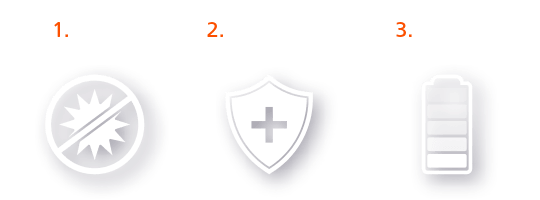The Science behind Sambucol
How Sambucol Works
Influenza viruses replicate themselves by entering healthy cell membranes and then spread throughout the body.
Several studies suggest that Sambucol’s distinct mode of action works by preventing the initial viral infection through three simultaneous ways.

Clinical and Research Summary
Sambucol® was found to be beneficial to the stimulation of the immune system in healthy individuals. Also excellent results have been found in more “sensible” patients with influenza, cancer and HIV which have decreased immune functions.
2004 – Influenza A Trial3
2006 – Avian Flu Study (in vitro)4
Sambucol had a positive result as an anti-viral against coronavirus. The lab study observed Sambucol caused a 41% inhibition of viral particle replication of coronavirus at a dilution of 1:32.
UK NHS CLINICAL TRIAL
A randomised single blinded study investigating the role of Sambucol Black Elderberry liquid (Sambucol nigra) in the treatment, progression and reduction of symptoms in participants with Coronavirus-19. Trial began January 2021 and is ongoing.
- Zakay-Rones et al, Inhibition of Several Strains of Influenza Virus in Vitro and Reduction of Symptoms by an Elderberry Extract (Sambucus nigra L.) during an Outbreak of Influenza B Panama, The Journal of Alternative and Complementary Medicine, vol. 1, number 4, 1995, pp. 361-369
- Barak, Halperin and Kalickman, The Effect of Sambucol®, a Black Elderberry-Based, Natural Product, on the Production of Human Cytokines: I. Inflammatory Cytokines, European Cytokines Network, Volume 12, no. 2, pages 290-296, June 2001
- Zakay-Rones, Thom, Wollan and Wadstein, Randomized Study of the Efficacy and Safety of Oral Elderberry Extract in the Treatment of Influenza A and B Virus Infections, The Journal of International Medical Research, no. 32, 2004, pp. 132-140
- Balasingam et al, Neutralizing activity of SAMBUCOL® against avian NIBRG-14 (H5N1) influenza virus, St Bartholomew’s & The Royal London School of Medicine & Dentistry, University of London, 1996
- Roschek et al, Elderberry Flavonoids ind to and prevent H1N1 infection in vitro, Phytochemistry, vol 10, issue 10, 2009
- Randall S. Porter and Robert F. Bode Meta-analysis – A Review of the Antiviral Properties of Black Elder (Sambucus nigra L.) Products, Phytotherapy Research 31: 533-554, 2017
- Torabian et al, Anti-influenza activity of elderberry (Sambucol nigra), Journal of Functional Foods 54, 353-360, 2019
- Builes, López et al, Quantifying in vitro antiviral activity of natural compounds against SARS-GoV-2, a report published by the University of Antioquia, Colombia August 2020
